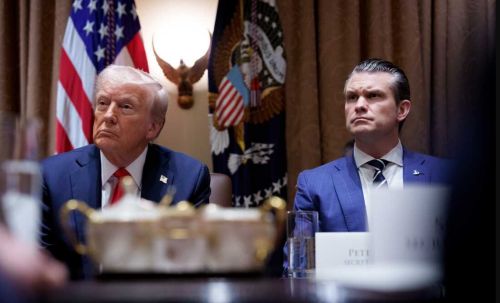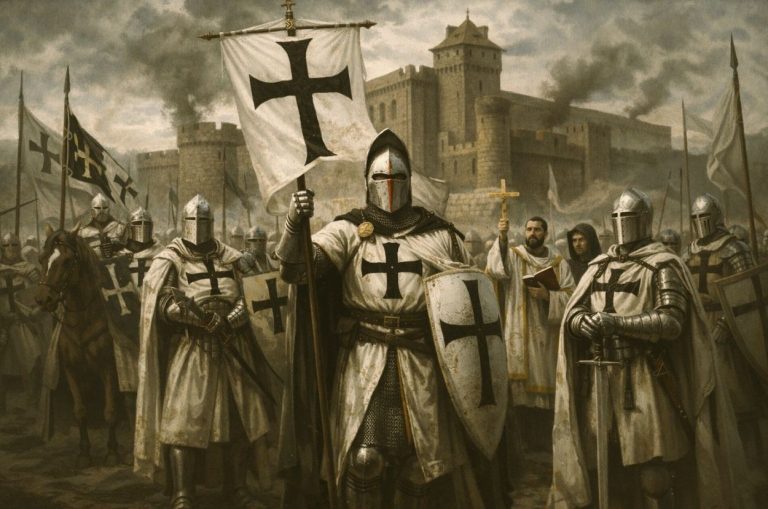

Together, Trump and Hegseth represent the convergence of hubris and inexperience, with the potential to steer the United States into its own Teutoburg moment of ancient Rome.

By Matthew A. McIntosh
Public Historian
Brewminate
Introduction
History offers sobering lessons about what happens when leaders without genuine military competence try to direct armies like pieces on a personal chessboard. Adolf Hitler, who served briefly as a corporal in World War I, believed his battlefield experience gave him the authority to overrule seasoned generals. In reality, his constant interference in strategy, from micromanaging operations on the Eastern Front to refusing tactical retreats, contributed directly to the collapse of the Third Reich, as military historians have long noted. Yet even Hitler, disastrously misguided as he was, still had some firsthand exposure to combat and the military chain of command.
Donald Trump, by contrast, has no such background. He famously avoided service in Vietnam through draft deferments and medical exemptions, leaving him with no military record at all. Despite this absence of experience, Trump has positioned himself as the ultimate arbiter of military decisions, openly musing about using American cities as “training grounds” for troops in remarks that alarmed even career officers (Military Times). His approach mirrors the dangerous hubris of past leaders who mistook political theater for strategic acumen.
Equally troubling is the ascent of Pete Hegseth, Trump’s longtime ally and Fox News commentator, now charged with overseeing the Pentagon. Hegseth did serve in the National Guard, but his military record, platoon-level leadership without higher command responsibilities, pales in comparison to the towering demands of directing the world’s most powerful armed forces. Critics argue that his lack of experience, coupled with an ideological zeal honed on television rather than in strategic planning rooms, makes him a perilously unqualified choice.
The danger, then, is not abstract. History’s great cautionary tales, from the annihilation of Roman legions under Publius Quinctilius Varus in the Battle of the Teutoburg Forest, to Hitler’s catastrophic mismanagement of Germany’s war machine, demonstrate how misplaced confidence and untrained command can end in ruin. Today, as Trump and Hegseth consolidate power over the U.S. military, the United States risks marching blindly toward its own metaphorical Teutoburg: a disaster not of enemy cunning alone, but of leadership that cannot tell the difference between strategy and spectacle.
Historical Precedents
Hitler’s Military Micromanagement and Its Consequences
Adolf Hitler’s failures as commander-in-chief illustrate the perils of political hubris colliding with professional military judgment. Though he had served as a corporal in World War I, his rank and experience offered little preparation for directing a global war. Hitler repeatedly sidelined or dismissed professional generals who challenged him, demanding absolute obedience even in situations that called for tactical flexibility. His refusal to allow retreats at critical moments, such as at Stalingrad in 1942, led to devastating losses, costing hundreds of thousands of German lives.
Historians have long emphasized how Hitler’s personal obsession with control paralyzed German strategy, replacing rational planning with ideological stubbornness. By insisting on unrealistic offensives and preventing commanders from adapting to battlefield conditions, he not only weakened the Wehrmacht but accelerated the Reich’s collapse. As one analysis concludes, Hitler’s “tactical interference and lack of trust in his generals” were major factors in Germany’s defeat.
The Varus Disaster: Teutoburg Forest as a Warning
Well over a millennium before Hitler, Rome suffered one of its greatest military humiliations: the Battle of the Teutoburg Forest in 9 CE. Publius Quinctilius Varus, a Roman governor with limited battlefield acumen, marched three legions into unfamiliar territory, relying heavily on the loyalty of Arminius—a Germanic chieftain who secretly plotted against Rome. Caught in a dense forest with little room to maneuver, the legions were ambushed, annihilated, and their eagles captured. The disaster was so total that Augustus reportedly wandered the palace, crying, “Quintili Vare, legiones redde!” (“Varus, give me back my legions!”)
The Teutoburg catastrophe stemmed from arrogance, overconfidence, and the refusal to heed local intelligence. Varus underestimated both the terrain and his opponent, trusting loyalty where there was none. His misjudgment not only cost Rome thousands of lives but also set the empire’s northern frontier for centuries. The metaphor resonates today: when leaders without the training, prudence, or humility to recognize limits assume command, even the mightiest armies can be led into disaster.
Other Cases of Civilian Overreach
The caution extends beyond Rome and Nazi Germany. Civilian control of the military is a cornerstone of democracy, but history shows how dangerous it becomes when political leaders attempt to micromanage operations without respecting professional expertise. From Napoleon III’s mishandling of the Franco-Prussian War to Lyndon Johnson’s tactical interference in Vietnam, the pattern is clear: when ideology or ego replaces strategic judgment, armies stumble and blood is spilled.
The Trump Factor: No Military Credibility, No Structural Discipline
Trump’s Lack of Military Experience
Unlike Hitler, who at least wore the uniform of a corporal in World War I, Donald Trump has no service record at all. During the Vietnam War, he received four education deferments and later a medical exemption for bone spurs, effectively avoiding the draft. As a result, he never learned the discipline, culture, or operational structure of military life. That absence matters. Presidents from Dwight Eisenhower to George H.W. Bush drew on their own service to inform decisions; Trump instead approaches military power as spectacle, often treating it as an extension of political theater rather than a professional institution bound by doctrine and law.
Purging Generals and Centralizing Authority
Trump’s tendency to elevate loyalty above competence has long alarmed defense experts. During his first term, he repeatedly clashed with senior military officials, often dismissing them when they resisted political directives. Analysts warned that his “pattern of purging our highest-performing military officers is dangerous,” destabilizing the professional continuity of the armed forces. In his second term, that instinct has intensified. By removing seasoned generals and replacing them with politically aligned figures, Trump risks turning the Pentagon into a loyalty-driven echo chamber, leaving the military stripped of critical dissenting voices.
Militarizing Domestic Politics
The most alarming sign of Trump’s approach is his repeated suggestion that the U.S. military should play a domestic role. At a recent meeting with top officers, Trump floated the idea of using American cities as “training grounds” for troops, framing the nation itself as a battlefield and speaking of preparing for a “war from within.” Such rhetoric blurs the line between external defense and internal policing, a line carefully preserved in American law since the founding. Military scholars warn that this kind of framing risks normalizing the use of armed forces against civilians, undermining both democratic norms and the military’s professional ethos.
Performance as Spectacle, Not Strategy
Trump’s approach to force projection has often been performative. As the European Council on Foreign Relations observed, his use of military power during his first term revealed “patterns of bluster, threats, and occasional strikes” designed more for political impact than strategic outcomes. The danger lies in extending that pattern into a second presidency with greater control over appointments: the risk is not only symbolic misuse of the military but also the potential for catastrophic miscalculations when performative threats cross into real-world action.
Pete Hegseth: The Modern-Day “Varus” at the Pentagon?
From Platoon Leader to Pentagon Chief
Pete Hegseth’s rise from Army National Guard officer to Secretary of Defense is extraordinary not for its depth of military achievement but for how little traditional command experience he brings to the job. He served as an infantry platoon leader at Guantánamo Bay and later deployed to Iraq, experiences that gave him exposure to the battlefield but not the strategic or institutional responsibilities normally associated with top civilian defense leadership. Most of his post-service career was spent in the media, where he cultivated an image as a Fox News military analyst and outspoken conservative commentator.
By comparison, nearly every modern Secretary of Defense has either commanded at high levels, held significant Pentagon or congressional defense positions, or demonstrated years of civilian management experience in large-scale organizations. Hegseth, critics argue, represents a sharp break from that tradition. As one assessment bluntly put it, he “would have the least amount of military experience of any defense secretary in recent history.”
Confirmation and Controversy
Hegseth’s confirmation hearings underscored those concerns. He faced pointed questions about his qualifications, past conduct, and ideological commitments, with fact-checkers noting contradictions and exaggerations in his testimony. His nomination was met with visible unease among career officers, some of whom expressed “military fury” at the idea of a television pundit assuming control over their institution. Even after taking office, his efforts to brand himself as a “man of the troops” have been met with skepticism within the ranks.
Ideology Over Expertise
Hegseth’s tenure has already shown an emphasis on ideological projects over structural military needs. He ordered the end of race and gender considerations in service academy admissions, a move framed as combating “wokeness” but criticized by senior educators as undermining recruitment and diversity. He has also pushed cultural messaging campaigns focused on “warrior ethos” branding, even as critics warn such efforts substitute sloganeering for genuine preparedness.
At the bureaucratic level, Hegseth has overseen sweeping changes in Pentagon staffing, consolidating offices and restructuring oversight roles, including inspector general positions. While billed as efficiency reforms, these changes also reduce internal checks on leadership, raising alarms about the concentration of authority.
The Varus Trap
The analogy to Varus at Teutoburg is hard to miss. Like the Roman governor, Hegseth carries himself with confidence that belies his limited command background. He appears determined to reshape the military along ideological lines, prioritizing loyalty and symbolism over professional expertise. In doing so, he risks leading the armed forces into situations for which neither he nor his political patrons are adequately prepared.
Just as Varus ignored warnings and underestimated the complexity of the terrain, Hegseth could steer U.S. forces into metaphorical ambushes, be they ill-conceived deployments, politically motivated domestic missions, or structural hollowing-out of readiness. History suggests such hubris rarely ends with victory banners.
Comparative Risk Assessment
Overview
The dangers posed by Donald Trump and Pete Hegseth’s leadership over the U.S. military can be most clearly understood by placing them alongside their historical counterparts. Though the contexts differ, the recurring pattern is unmistakable: when authority is wielded without competence, and when ideology is allowed to trump professional expertise, disaster follows.
Trump and Hitler: Hubris at the Top
Adolf Hitler and Donald Trump share the instinct to centralize military authority in themselves, sidelining experts who might challenge their vision. Hitler’s refusal to allow his generals operational flexibility in the East, especially at Stalingrad, is remembered as a turning point in the collapse of German power. Trump has displayed a similar disregard for professional input, openly entertaining the use of military force against U.S. cities (Military Times) and purging generals who refused to conform to his political demands. While America’s institutional safeguards are stronger than Weimar Germany’s, Trump’s trajectory nonetheless echoes the dangers of substituting personal ego for strategic judgment.
Hegseth and Varus: The Unready Commander
If Trump is the political architect of this experiment, Hegseth is its executor. His career arc, from National Guard officer to Fox News host to Secretary of Defense, has given him little of the strategic seasoning normally expected for leadership of the Pentagon. Like Varus, Hegseth exudes confidence that belies his limited preparation. His early moves in office (prioritizing ideological battles over readiness, hollowing out oversight structures, and dismissing internal critics) create conditions ripe for avoidable blunders.
Converging Risks
Together, Trump and Hegseth embody two strands of historical failure: the autocrat who views military power as a tool of personal authority, and the untested commander who mistakes loyalty and slogans for strategy. The convergence of these traits magnifies the risks. Trump’s willingness to politicize the military, coupled with Hegseth’s lack of depth in institutional command, could produce a chain of decisions where dissenting voices are silenced, expertise is ignored, and deployments are shaped more by politics than necessity.
The plausible consequences are sobering. At best, the armed forces could be misused in symbolic, politically motivated missions that erode public trust. At worst, the nation could stumble into a “Teutoburg moment,” a catastrophic loss born not of enemy brilliance, but of leadership hubris and structural incompetence.
Policy Recommendations and Watch-Points
Overview
History is filled with examples of militaries that were undone not by foreign enemies but by the failures of their own leaders. To avoid repeating such errors under Trump and Hegseth’s stewardship, the United States must reinforce the guardrails of democratic oversight and institutional resilience.
Strengthen Congressional Oversight
Congress retains the power of the purse and the authority to question, delay, or block dangerous policy shifts. Lawmakers should use hearings, appropriations, and public reporting requirements to ensure that military decision-making remains transparent and accountable. Special attention must be given to purges of career officers and the politicization of promotions, where the erosion of merit-based leadership can do long-term damage.
Safeguard Professional Military Advice
The Joint Chiefs of Staff and senior flag officers must be empowered to provide candid assessments, even when those assessments contradict the political agenda of civilian leadership. Whistleblower protections and inspector general offices should be reinforced, not weakened, to ensure that internal dissent can surface without retaliation. Efforts to consolidate or eliminate oversight positions, such as those already initiated by Hegseth, must be resisted.
Protect Against Domestic Militarization
Trump’s rhetoric about using American cities as “training grounds” (Military Times) should be treated as a red-line warning. The Posse Comitatus Act and related safeguards exist precisely to prevent the military from being deployed against citizens except under the narrowest conditions. Congress, courts, and state governors must be vigilant in opposing attempts to normalize domestic militarization.
Monitor the “Varus Trap” Indicators
Observers should track early warning signs of leadership hubris that mirror Varus’s missteps: dismissals of experienced advisors, overconfidence in untested strategies, and ideological posturing that substitutes for genuine readiness. Public reporting, investigative journalism, and think tank analysis play a critical role in spotlighting these developments before they metastasize into full-blown crises.
Maintain a Professional Ethos
Finally, the armed forces themselves must resist efforts to be transformed into partisan instruments. While civilian control is foundational, the military’s professional ethos, loyalty to the Constitution rather than any one leader, remains the last line of defense. Reinforcing education at service academies, promoting leaders who embody institutional integrity, and cultivating public trust are all essential to insulating the military from ideological capture.
Conclusion
The past is littered with warnings that leaders ignore at their peril. In the Roman forests of Germania, Publius Quinctilius Varus led three legions to annihilation because he mistook arrogance for strategy. In the twentieth century, Adolf Hitler’s refusal to trust his generals doomed his own armies, proving that battlefield bravado cannot substitute for professional competence. These are not remote parables but urgent lessons, showing how even the strongest military machines can be undone from within.
Donald Trump and Pete Hegseth now stand in positions where those lessons matter most. Trump, with no service record and a history of treating the military as a stage for political theater, shows little respect for the institutional expertise that safeguards national security. Hegseth, elevated from media punditry to Pentagon chief, embodies the danger of entrusting an ideologue with responsibilities far beyond his command experience. Together, they represent the convergence of hubris and inexperience, with the potential to steer the United States into its own Teutoburg moment.
The stakes are not abstract. Trump has already spoken of turning American cities into “training grounds” for the military (Military Times), a suggestion that collapses the boundary between foreign defense and domestic policing. Hegseth has prioritized ideological projects over institutional integrity, echoing Varus’s blind march into the forest. If history is any guide, the combination of an unchecked autocrat and an untested commander is not just imprudent; it is catastrophic.
The United States still has choices. Oversight, professional integrity, and constitutional safeguards can prevent disaster if they are defended with vigilance. But if these guardrails fail, then the world’s most powerful military may find itself commanded by leaders unfit for the burden they carry. And history tells us plainly what happens when hubris commands an army: the legions do not return.
Originally published by Brewminate, 10.06.2025, under the terms of a Creative Commons Attribution-NonCommercial-NoDerivatives 4.0 International license.


